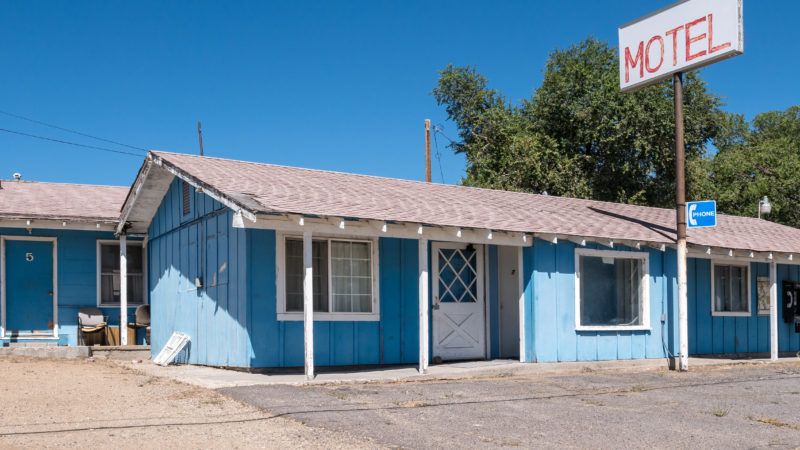California Hospital Sinks Plan To House Homeless in Nearby Motel, Citing Danger Posed to Employee Parking Lot
The Bakersfield City Council has refused to grant a permit for a local nonprofit to lodge homeless residents in a roadside inn as part of the state's Project Roomkey.

Nonprofit homelessness advocates have spent the COVID-19 pandemic trying to house homeless people in hotels rather than crowded shelters where the coronavirus can easily spread. Time and again, these advocates have run into opposition from NIMBY neighbors and city officials.
The latest example comes from Bakersfield, California. On Tuesday, Los Angeles Times columnist Erika Smith published a story detailing how a local hospital scuttled plans to lodge homeless residents in a nearby motel because it was too close to their employee parking lot.
Bakersfield's local homeless nonprofit, the Bakersfield-Kern Regional Homeless Collaborative (BKRHC), had planned to rent out 21 rooms in the city's Rosedale Inn for several months at the cost of $383,966. Funding was to be provided by the state's Project Roomkey, a largely federally funded program that pays for putting up homeless people in hotel rooms and providing services to them while they're there.
The Times reports that previous attempts to house some of Bakersfield's homeless residents in hotels had fallen through because of opposition from nearby homeowners. BKRHC's director, Anna Laven, had hoped that the Rosedale Inn, which was not near any residential neighborhood, would be a less controversial location.
But while it wasn't next to any housing, the roadside motel was near the Bakersfield Heart Hospital, whose employee parking lot is located a short distance from the Rosedale Inn.
Using the inn as temporary housing for the homeless required the city's Board of Zoning Adjustment to issue a conditional use permit to the BKRHC. In an August 10 letter, the hospital's lawyers argued against the plan.
Granting BKRHC's permit "would significantly add to the problems which already emanate from the Rosedale Inn which includes but [is] not limited to, illicit drug use, vagrancy, theft, and vandalism of hospital property, theft and vandalism of cars parked on hospital property and an increased exposure of patients and staff of the hospital to COVID-19 and other adverse consequences," reads the letter.
The letter from hospital attorneys also asserted that the homeless themselves would be made worse off by being housed in the Rosedale Inn, given the reported crime and drug use that happens there.
That letter didn't manage to convince the city's zoning board, which voted to grant BKRHC a conditional use permit. However, the hospital appealed the decision to the Bakersfield City Council, which proved more receptive to its concerns. It rejected BKRHC's permit application, leaving the organization without much hope of finding another motel to serve as a site for its Project Roomkey initiative.
This is hardly the first time that a plan to put up homeless people in hotels during COVID-19 has been shot down as a result of neighborhood opposition.
New York City's decision to lodge 300 homeless men in a hotel on the city's wealthy Upper West Side neighborhood met with such fierce opposition from existing residents that the city eventually agreed to relocate the men.
Back in April, the mayor of Florence, Kentucky pressured a hotel to back out of an agreement it had made with two local nonprofits to rent out 40 rooms to serve as temporary housing the area's homeless population.
Whether they represent wealthy, urban, and liberal communities, or poorer, rural, conservative ones, few local politicians seem to like the idea of having homeless people live indoors nearby. Zoning codes requiring additional approval for temporary housing arrangements often enable this rank NIMBYism.
Worse still this NIMBYism serves only to interfere with voluntary arrangements made by nonprofits serving the homeless, the hotel owners willing to house them, and the homeless themselves who are eager to avoid bunking in dangerous shelters.
Rent Free is a weekly newsletter from Christian Britschgi on urbanism and the fight for less regulation, more housing, more property rights, and more freedom in America's cities.


Show Comments (56)